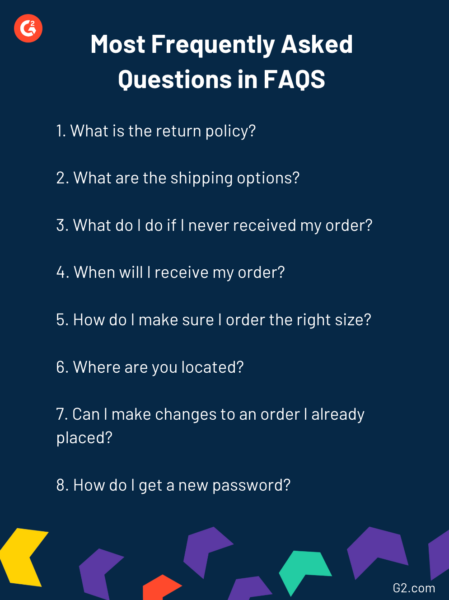FAQ, short for Frequently Asked Questions, is a compilation of common queries and their respective answers regarding a particular topic or service. It serves as a valuable resource for users seeking quick solutions to their inquiries without the need for extensive research or support assistance.
Understanding FAQ (Frequently Asked Questions)
FAQ sections are ubiquitous across websites, forums, and customer support portals. They are designed to streamline information dissemination and enhance user experience by addressing common concerns proactively. These sections typically feature concise answers to recurring questions, organized in a user-friendly manner for easy navigation.
Analyzing Key Features of FAQ (Frequently Asked Questions)
The effectiveness of a FAQ section lies in its ability to provide accurate and relevant information promptly. Key features include:
- Clarity: Answers should be clear and easy to understand, avoiding technical jargon or ambiguity.
- Comprehensiveness: FAQ sections should cover a wide range of topics and address diverse user queries.
- Accessibility: Information should be easily accessible through intuitive navigation and search functionalities.
- Update Frequency: Regular updates ensure that the FAQ section remains current and reflects any changes or developments.
- Multimedia Integration: Incorporating visuals, such as videos or infographics, can enhance user engagement and understanding.
Types of FAQ (Frequently Asked Questions)
FAQs can be categorized based on various criteria, including the nature of the service or product they pertain to and the target audience. Common types of FAQs include:
| Type | Description |
|---|---|
| General FAQs | Address common questions about a service or product, such as pricing, features, and usage. |
| Technical FAQs | Provide solutions to technical issues or troubleshooting guidance. |
| Billing FAQs | Clarify inquiries related to payment methods, subscription plans, and billing cycles. |
| Product-Specific FAQs | Focus on specific products or services, delving into unique features or functionalities. |
Ways to Use FAQ (Frequently Asked Questions)
FAQ sections can serve multiple purposes and cater to various stakeholders, including:
- Customer Support: Offering self-service options for users to find solutions independently.
- Lead Generation: Addressing potential customers’ concerns and alleviating doubts to facilitate conversions.
- Knowledge Sharing: Educating users about the features and capabilities of a product or service.
- SEO Enhancement: Including relevant keywords and phrases to improve search engine visibility and attract organic traffic.
Challenges and Solutions in FAQ (Frequently Asked Questions) Implementation
Despite their benefits, FAQ sections may encounter challenges such as:
- Outdated Information: Regular updates are essential to ensure the accuracy and relevance of answers.
- Limited Coverage: Some queries may not have predefined answers, requiring manual intervention or personalized support.
- User Engagement: Maintaining user interest and participation in the FAQ section can be challenging over time.
To overcome these challenges, organizations can implement strategies such as:
- Dynamic Content Management: Utilizing content management systems to facilitate real-time updates and revisions.
- Community Engagement: Encouraging user contributions through forums or community-driven support platforms.
- Analytics and Feedback: Monitoring user interactions and soliciting feedback to identify areas for improvement.
Main Characteristics and Comparisons
To better understand the distinctions between FAQ and related terms, consider the following comparisons:
| Term | Description |
|---|---|
| FAQ vs. Knowledge Base | FAQ focuses on concise answers to common queries, while knowledge bases offer comprehensive information on various topics. |
| FAQ vs. Help Desk | FAQ provides self-service solutions to common issues, while help desks offer personalized assistance through ticketing systems. |
| FAQ vs. Chatbots | FAQ relies on predefined answers to address queries, while chatbots utilize artificial intelligence to engage in real-time conversations. |
Future Perspectives and Technologies
The future of FAQ lies in advancements in artificial intelligence (AI) and natural language processing (NLP). Emerging technologies such as chatbots and virtual assistants are poised to revolutionize the way users interact with FAQ sections, offering personalized, conversational experiences that mimic human interaction.
VPN Integration with FAQ
VPN (Virtual Private Network) technology can complement FAQ sections by enhancing user privacy and security. By encrypting internet traffic and masking IP addresses, VPNs safeguard sensitive information exchanged during FAQ browsing sessions, protecting users from potential cyber threats and surveillance.
Resources for Further Information
For more insights into FAQ implementation and optimization strategies, refer to the following resources:
- Zendesk: Best Practices for Creating a FAQ Page
- HubSpot: How to Create an Effective FAQ Page
- Userlike: FAQ vs. Knowledge Base – What’s the Difference?
By leveraging the power of FAQ sections and embracing evolving technologies, organizations can streamline customer support processes, foster user satisfaction, and drive business growth in an increasingly digital landscape.


